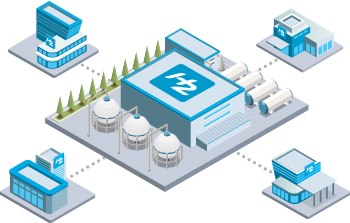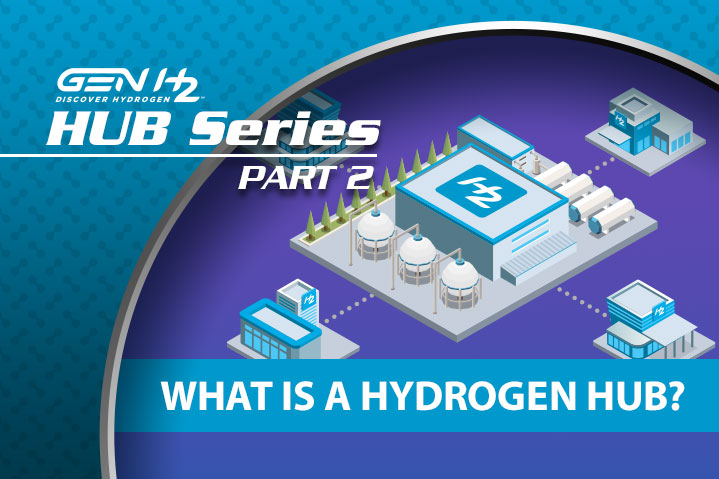Hub Series: Part 2
By: GenH2 Staff
Read Time: 3 minutes
What is a Hydrogen Hub?
As we discussed in our previous installment and series overview, the U.S. Department of Energy (DOE) released a Notice of Intent (NOI) to fund the Bipartisan Infrastructure Law’s $8 billion program to develop regional clean Hydrogen Hubs (H2Hubs) across America. The program aims “to accelerate the use of clean hydrogen by creating a network of producers, consumers, and local connective infrastructure to accelerate the use of hydrogen as a clean energy source.” The production, processing, storage, delivery, and end-use of clean hydrogen, including innovative uses in the industrial sector, are crucial to the DOE’s strategy to reduce carbon emissions.
Hydrogen Hubs
 A Hydrogen Hub is a network of infrastructure located in close proximity which integrates a number of hydrogen-based energy services that connect hydrogen producers and consumers. These services will match the supply and demand for hydrogen energy and will initially be focused on locations of suitable demand. The clustered design of a centralized Hub allows for the sharing of technology and infrastructure creating economies of scale and lower unit costs of energy for each service that shares the infrastructure.
A Hydrogen Hub is a network of infrastructure located in close proximity which integrates a number of hydrogen-based energy services that connect hydrogen producers and consumers. These services will match the supply and demand for hydrogen energy and will initially be focused on locations of suitable demand. The clustered design of a centralized Hub allows for the sharing of technology and infrastructure creating economies of scale and lower unit costs of energy for each service that shares the infrastructure.
Regional Clean Hydrogen Hubs will produce clean hydrogen from multiple energy resources; demonstrate diverse end uses; create training/employment opportunities; and cover different regions of the United States. The implementation of H2Hubs will ultimately demonstrate a viable model that can be scaled to locations across the United States, lowering production costs and creating the infrastructure needed for a larger hydrogen economy. With the implementation of H2Hubs, the hydrogen economy has the potential to displace fossil fuels and fully capitalize on the potential for renewable energy technologies. GenH2 has a dedicated team that is designing and engineering the next generation of liquid storage solutions, including lab or light-scale to 1 tonne per day (TPD) systems for the liquid hydrogen value chain.
One way the DOE is going to enable regional clean H2Hubs is through H2 Matchmaker, an online information resource to assist hydrogen suppliers and users, expand development and establish the regional clean hydrogen hubs. According to the DOE website, H2 Matchmaker will increase hydrogen and fuel cell regional project awareness; support private sector development of hydrogen production, storage, and transportation infrastructure; and facilitate regional business development opportunities.
Until North America establishes a national pipeline network, hydrogen will be a local market. However, the U.S. government’s multibillion-dollar effort to spur a national hydrogen economy has prompted developers to step forward with dozens of public- and private-sector H2Hubs initiatives. The U.S. Department of Energy (DOE) is expected to issue a Funding Opportunity Announcement for the H2Hubs program by October of this year and announce selected projects by May 2023.
Upcoming topics in our H2Hubs series will explore hubs and showcase GenH2’s planned role in helping to build them. We will discuss the innovative technology that GenH2 brings to the table and the important roles small companies can play in the creation of hubs. We will also closely examine the key role that GenH2’s hydrogen infrastructure solutions will play in the interconnectivity of major H2Hubs. So, join us in our Hub series as we answer the basic questions:
- What is the value of hubs, not only in the United States but globally?
- What are the key components and core technologies of a hub?
- Why are hydrogen hubs essential?
In the next installment of our hub series, we will be answering the question – What is the value of hubs, not only in the United States but globally?



